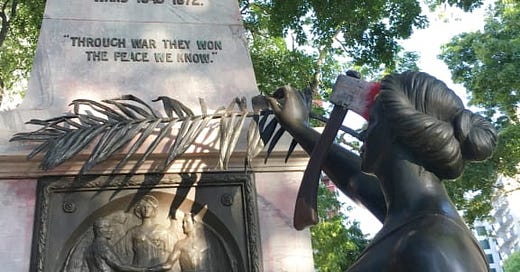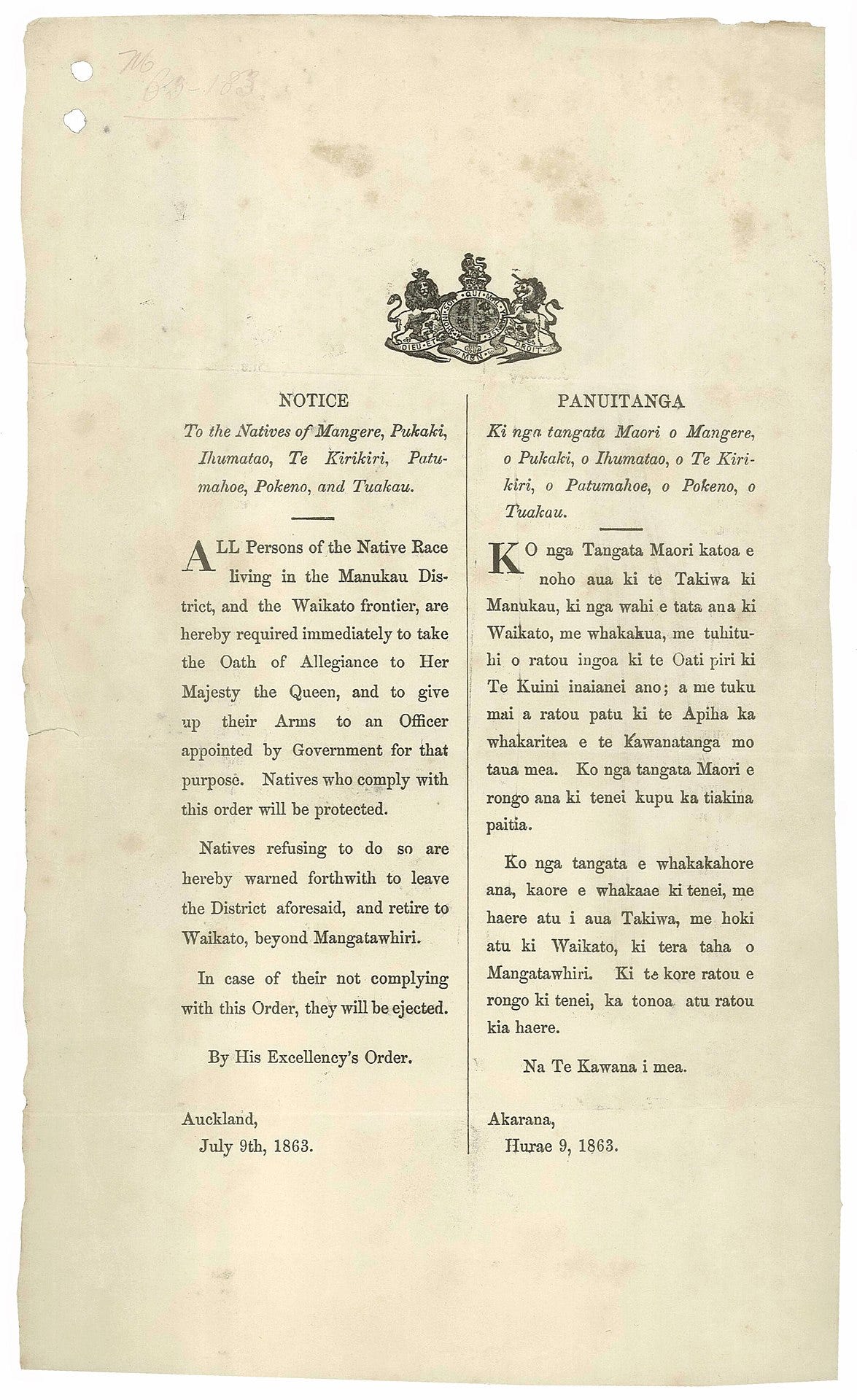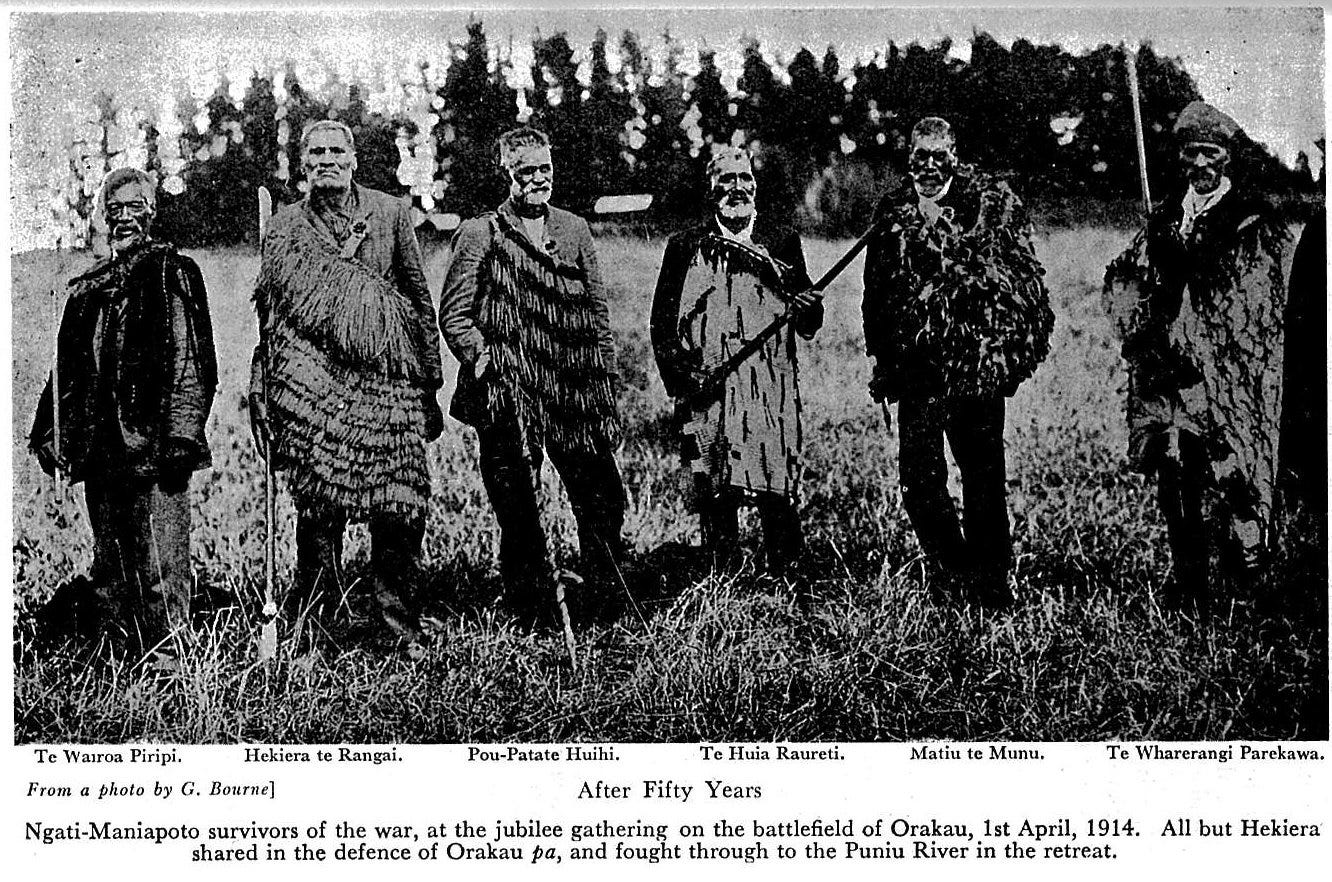Today is the 161st anniversary of British forces crossing the Mangatawhiri River, beginning the Invasion of the Waikato against the Kiingite tribes of the central North Island in 1863.
Although a triumphant struggle of the new order toppling that of the old, the invasion and the Land Wars in general rarely see the light of day in the minds of the general public. If the landings at Gallipoli represent a ‘coming into our own’ as a nation separate from Britain, then the victory over the Kingitanga is arguably the moment New Zealand really came into its own as a stable British colony, period.
Despite this, New Zealand does not hold any major ceremonies like that of the ANZAC Day commemorating the land wars, and any memorials that exist are often small, easily missable plaques or monuments, and in many cases not well maintained.

A few days earlier, on the 9th of July, Governor Grey issued an ultimatum to all Maori living north of the Mangatawhiri river - swear loyalty to the Queen or leave. Shortly after, Governor Grey made a proclamation of the beginning of military action in the Waikato. The proclamation read as follows:
"Europeans quietly living on their own lands in Waikato have been driven away; their property has been plundered; their wives and children have been taken from them. By instigation of some of you, officers and soldiers were murdered at Taranaki. Others of you have since expressed approval of these murders. Crimes have been committed in other parts of the island, and the criminals have been rescued, or sheltered under the colour of your authority.
You are now assembling in armed bands; you are constantly threatening to come down the river to ravage the settlement of Auckland, and to murder peaceable settlers. Some of you offered a safe passage through your territories to armed parties contemplating such outrages.
The well-disposed among you are either unable or unwilling to prevent these evil acts. I am therefore compelled, for the protection of all, to establish posts at several points on the Waikato River [...].
Those who wage war against Her Majesty, or remain in arms, threatening the lives of Her peaceable subjects, must take the consequences of their acts, and they must understand that they will forfeit the right to the possession of their lands guaranteed to them by the Treaty of Waitangi, which lands will be occupied by a population capable of protecting for the future the quiet and unoffending from the violence which they are now so constantly threatened.”
The official justification for the invasion, that Maori were planning to invade and sack Auckland, held no real merit, and British officers employed in the invasion were not particularly enthusiastic about the reasoning, but Grey’s invasion was ultimately justified if the end goal was to fulfil the broad mandate awarded to the British authorities through the Treaty of Waitangi - that Maori “[ceded] to Her Majesty the Queen of England absolutely and without reservation all the rights and powers of Sovereignty which the said Confederation or Individual Chiefs respectively exercise or possess, or may be supposed to exercise or to possess over their respective Territories as the sole sovereigns thereof.”
The Kingitanga, whether they actively pursued conflict with the Government or not, was a bastion of anti-colonial power in New Zealand. Although the British/European population had outgrown that of the Maori by the 1860s, the leadup to the invasion featured countless minor scuffles between colonial authorities and rebellious Maori, both near the Waikato as well as in the aforementioned Taranaki. Although the planned ‘attack’ on Auckland is largely considered a farce to drum up support, Grey’s decision to invade was inevitable as two parallel authorities could not exist without major conflict in the future. Grey’s decision was one of ‘solving’ a big problem before it could get any bigger.
Therefore, on this day 161 years ago, across the North Island, many of our major towns and cities were thrown into panic. Rural churches were seized for military use and barricaded, farmers were forced to abandon their properties or otherwise arm themselves against Maori raids, redoubts/fortresses were established to protect communities from being sacked by local armed bands, and fencible settlements served as beacons of civilisation amongst the uncleared New Zealand bush and swamp.

The campaign lasted around a year, although at an uncomfortably slow pace in some instances, and battles existed primarily in the form of sieges against Maori ‘Pa’ fortifications along the way deeper into the Waikato. While many of the Pa fortifications proved to be costly for the British forces to take considering the roughly 7 to 2 manpower favorability in favour of the British, only ~700 British casualties were taken during the campaign, compared to the ~1000 for Maori.
Consequently, the Kingitanga were effectively neutered by the Government, and could no longer pose a threat to their authority. Over a million hectares of land were seized as compensation for the invasion, and the Maori were never again so close to completely threatening British colonial authority over New Zealand.
Nowadays, New Zealand seems to be in an awkward position. We are too progressive to celebrate or commemorate the NZ Wars in a similar fashion to ANZAC Day, yet we are also too conservative to consistently condemn the NZ Wars like that of slavery in the US.
We exist in a limbo between acceptance and condemnation, yet the graves of our soldiers remain. Whether or not they are remembered honourably alongside the Great War soldiers they are buried next to is up to us. We should remember their sacrifice in creating New Zealand and defending their families, as we respect the Maori who lost their lives doing the same.
We will remember them.






I find your phrase, ".... We are too progressive to celebrate or commemorate the NZ Wars in a similar fashion to ANZAC Day, yet we are also too conservative to consistently condemn the NZ Wars like that of slavery in the US" unusual., to say the least. The only "slavery" existing in New Zealand has been the enslavement of Maori by Maori and no way can I view the NZ Wars , from the European side as having any similarity or relevance "slavery in the US." IN FACT, the NZ wars were fought against a sector of Maoridom who were slave owners.
".......any memorials that exist are often small, easily missable plaques or monuments, and in many cases not well maintained....."
.
Here, in Wanganui, we have a Council approved action to remove New Zealand’s first war memorial which stands in Moutoa Gardens , erected by the Province of Wellington at a cost of £700–£800 (equivalent to up to $100,000 in 2021). It was placed near the Whanganui River in the Moutoa Gardens near a sandy beach where the canoes of visiting Māori were traditionally moored.The monument was to commemorate the resident Maori who protected the residents of Wanganui from a Kingitanga invasion, However, the "chairman" of the Motu Gardens Trust, decided that he was going to have a hissy fit about the memorial's inscription on one face of the memorial which read, "...To / the memory of / those brave men / who fell / at / Moutoa / 14 May 1864 / in defence of / law and order / against / fanaticism and barbarism / this monument / is erected / by / the Province of Wellington"
The "Chairman" made this decision himself without even a meeting of the Trust involved and now the Council is going to have the memorial removed. The gardens were occupied illegally by Maori protesters in 1995 and a statue of John Ballance was repeatedly damaged until eventually it totally disappeared. A fountain was also obliterated by the protesters during th lengthy illegal occupation.
The Council has to date refused to say what is to be the fate of the memorial, where it is to go nor when this is to happen. All because of an opinionated cmplainate.